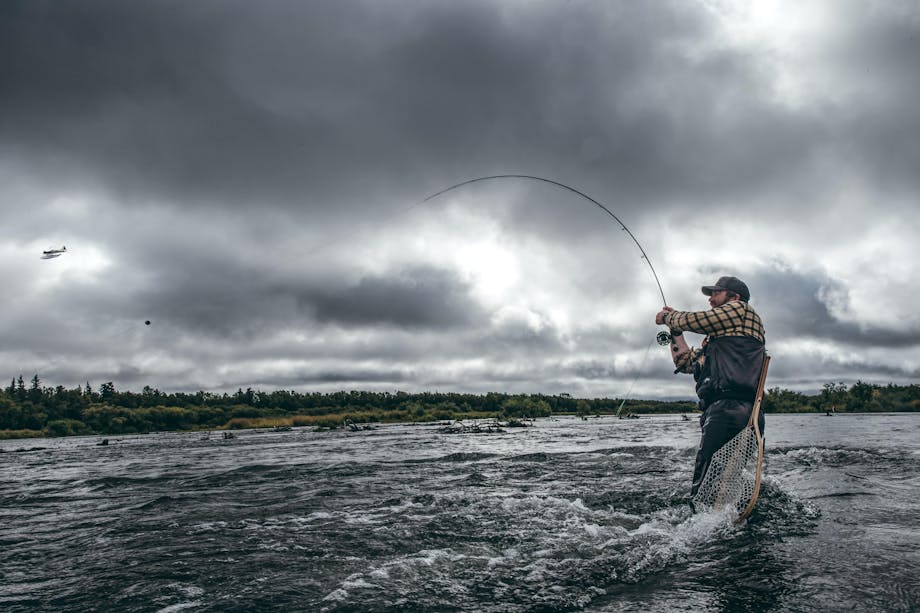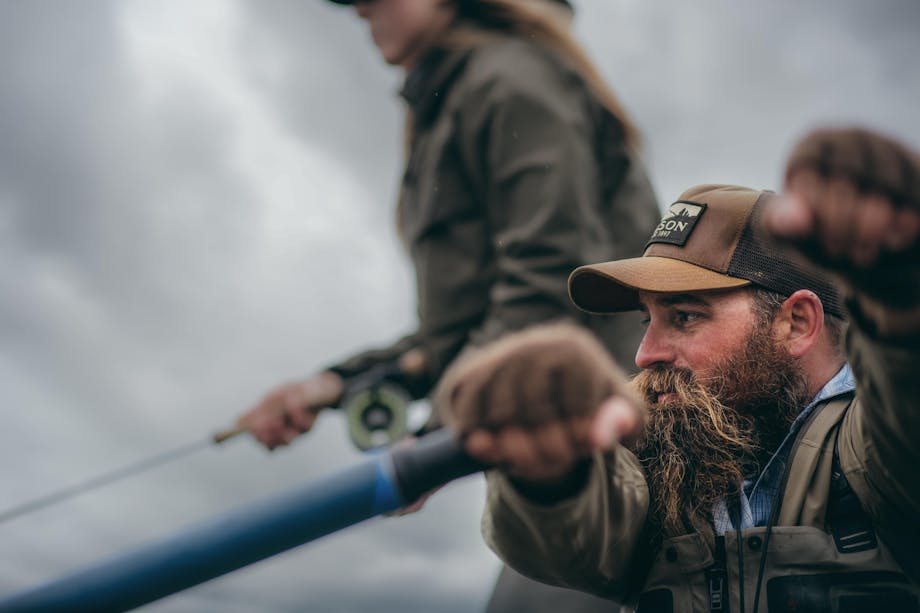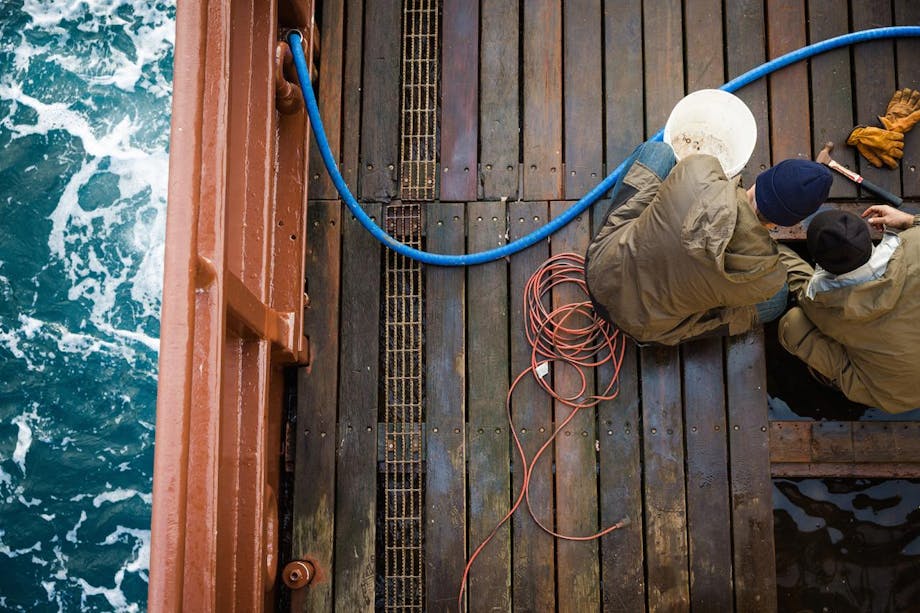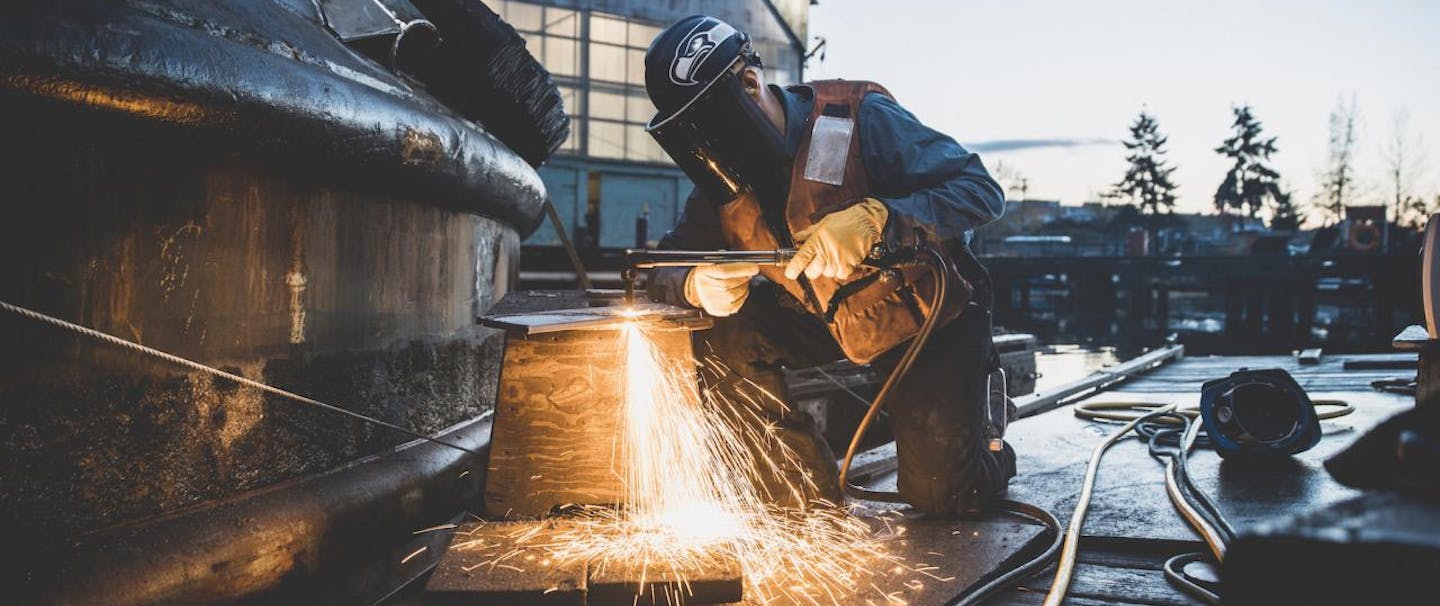On the latest Filson Life, writer Emily Wittenhagen traveled to Port Orchard, WA and spent the day with Liberty Elias Miller to find out more about live-aboard life in Washington’s marinas.
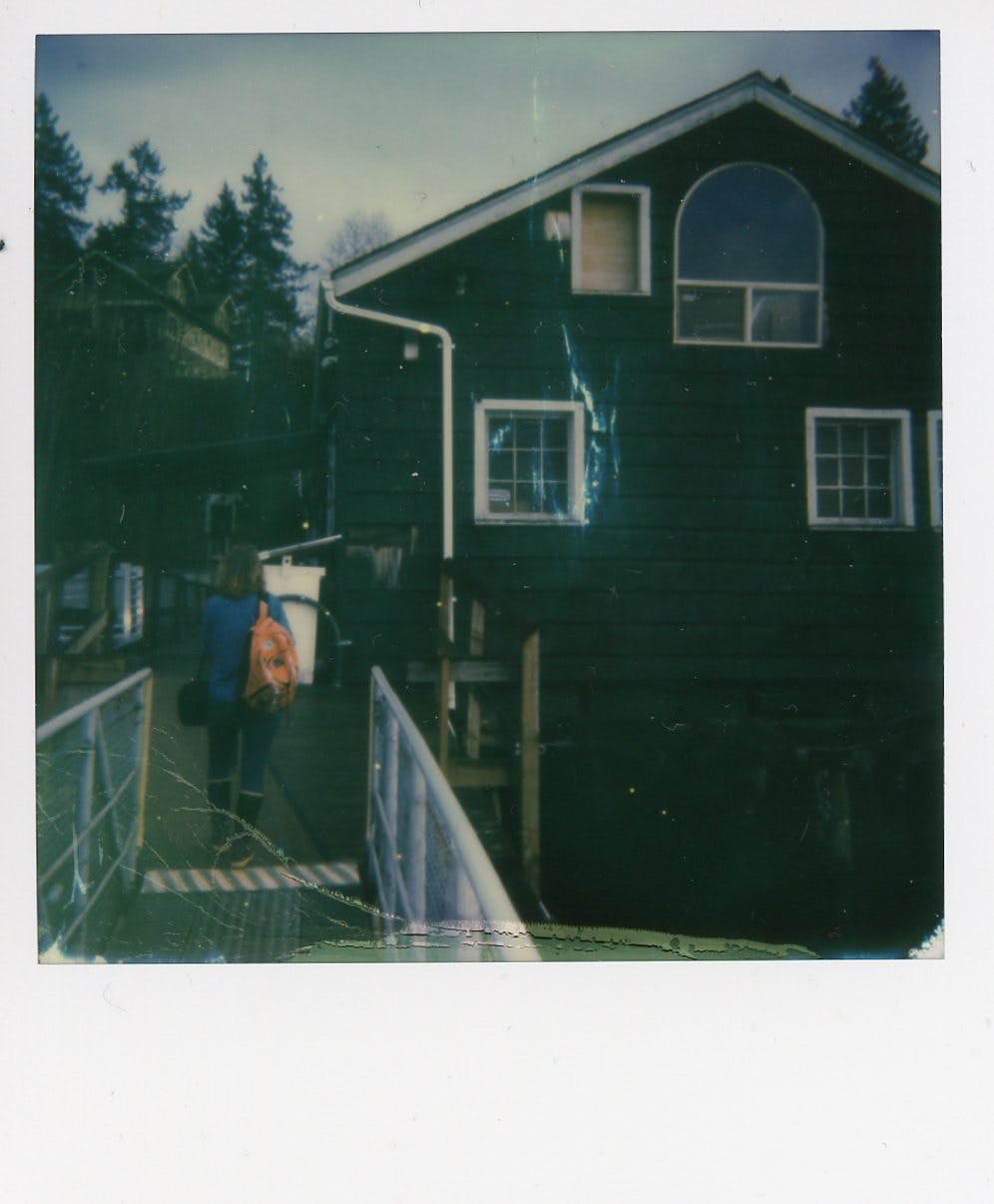
“There was this moment where everything almost went into slow motion and I was thinking, I’m really here. This is really it. I am really doing everything I have dreamed of since I was a tiny girl, and I’m not even scared.”
Liberty and I are in the wheelhouse at the top of the M/V Liseron, and she has me gripped in the middle of a story about fighting Tunisian bluefin poachers in the Mediterranean Sea. Then it starts to hail. For a moment the non-stop conversation we’ve been having for the past three hours pauses, and I’m reminded of the scene in Jaws when they’re below deck telling war stories over mugs of whiskey and Robert Shaw gives the famous Indianapolis speech as a storm pitches the boat back and forth outside.
While this comes partly out of my stubborn habit of pretending life is the plot of a movie or TV show, when we’re talking about Liberty’s life, it’s not imaginary. The scene she’s telling me about really was on a TV show called Whale Wars, following the Sea Shepherd Conservation Society as they fought whale poachers and other illegal fishing rings in international waters. She really does have war stories.
I recently spent one of the best afternoons of my life this way, hanging out with Liberty Elias Miller and the winter crew for The Boat Company aboard one of their ships in Port Orchard, WA. Here’s what I learned: in boat life, the kind that’s not yacht life, things aren’t always easy, but they are also never dull, showers at the YMCA cost $5 and, even though there’s no way to say this without sounding cheesy, there really are ways to live the dreams you had as a kid.
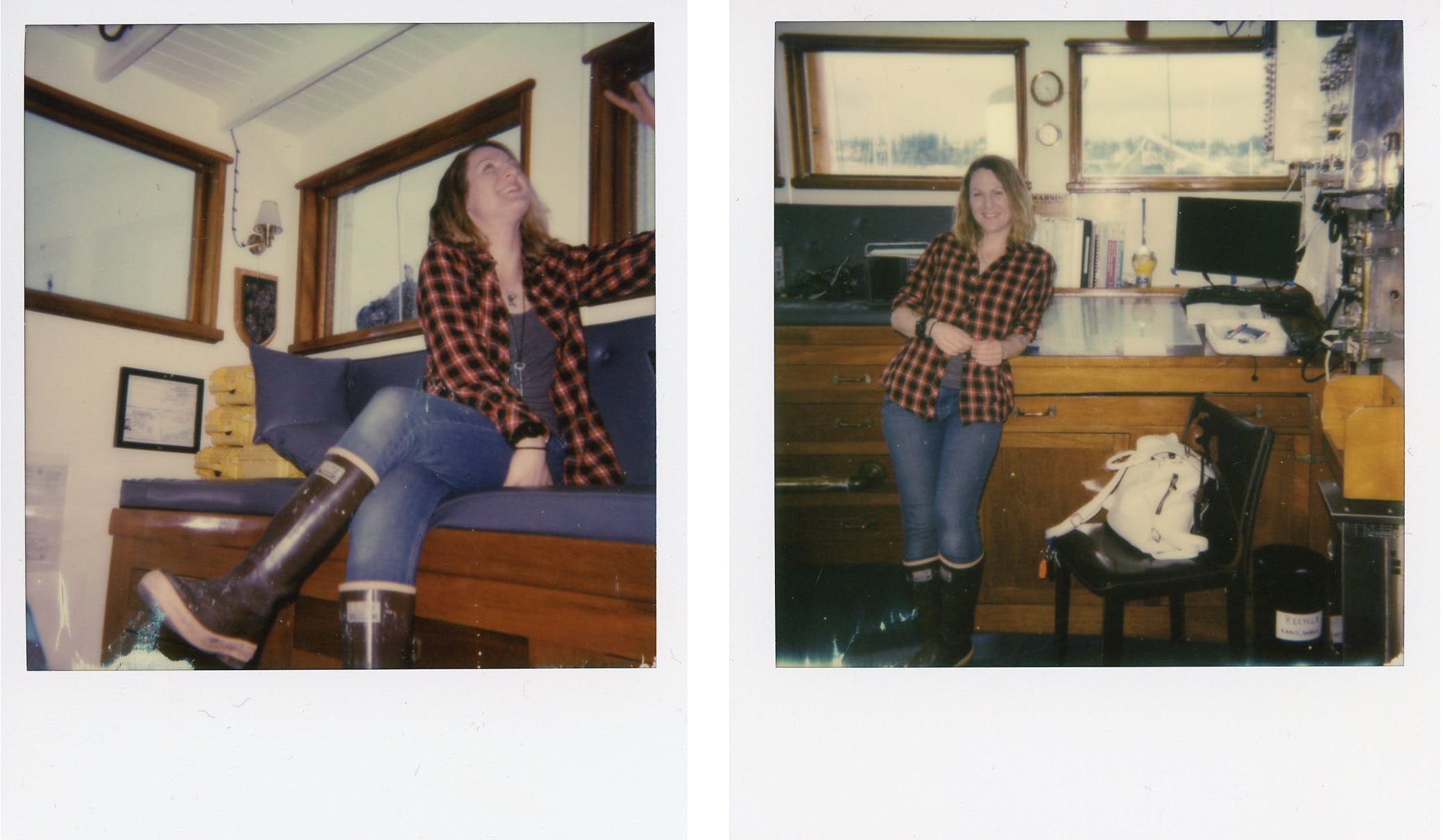
On our hands, the space between the thumb and the index finger has one of the best names in anatomy — “the thenar space.” Port Orchard is a town that sits on Washington’s Kitsap Peninsula in the little thenar space between the bottom two fingers, if you squint just right at the map, and it takes two ferries to get there if you go by foot.
Port Orchard is not one of the most well known port towns in the state, perhaps because it’s not as fancy as some of the others and doesn’t have stores where you can buy lavender sachets, but this is what I like about it. I’ve always had a softspot for the town because it has the kind of dive bars that I like; no muss, just dark booths, $3 whiskey, a menu that probably includes jalapeño poppers, and people who know how to tie knots.
Spending the day with Liberty and meeting the winter crew of the Liseron and its sister ship, the Mist Cove, is something I’ve been looking forward to for weeks. I’ve never met Liberty before today, but from the moment she pulls up to the ferry dock and I jump into the passenger seat of her Jeep, I feel like I’ve known her since at least sophomore year of high school. It might seem odd to mention, but I think it’s an important detail about Liberty, and a phenomenon about a lot of people I’ve met who live the life of boats: because they’ve made a life of creating homes wherever they go, and are so good at pitching and rolling, they have this very easy way of feeling like someone from your hometown. Even if you’ve just met them, they are old friends.
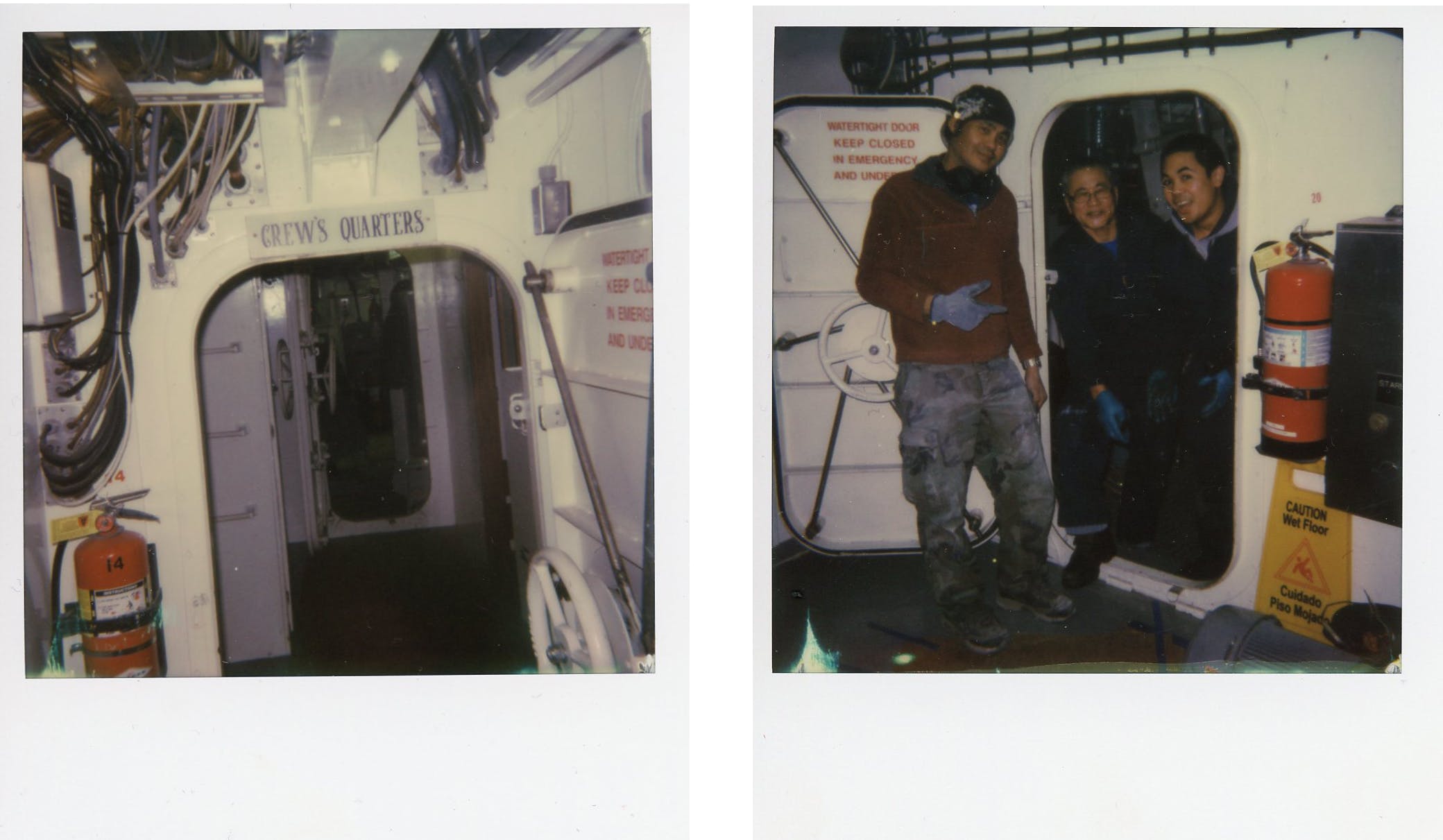
Liberty drives us a few streets away to the Railway Marina, where the Boat Company’s two ships are currently docked. The Liseron is an ex-Navy Minesweeper that was commissioned just after World War II. When he founded the Boat Company in 1980, Michael McIntosh (whose son Hunter now runs things) knew that he wanted this type of ship for carrying out his mission of bringing ecotourists to the Tongass National Forest in Alaska, the planet’s last significantly intact old-growth temperate rainforest, to share its beauty and encourage the conservation of this incredible piece of land, which for years has been the subject of a contentious battle between conservationists and those concerned that limitations to old-growth timber cutting threaten Southern Alaska’s economy.
Liberty is the sole winter live-aboard on the Liseron. She’s the one who checks all the decks at night, makes sure things are tied down, and sleeps in one of the passenger cabins. “I love this boat with everything I have,” she says.
At the marina, I meet Liberty’s boss Ken Gerken and some of the winter crew: Michael Hamilton, Anjo Zosa, Jose Bello, and his son Johannes Bello, who are incredibly friendly and all seem to have the magical ability of being in three places at once. (Crew members I didn’t meet this time, but who should be mentioned are Chris Ramsey and Hoang Quan.) They are busy painting shower doors, fixing ovens, oiling engines, and doing all kinds of other maintenance necessary to get the ships ready for summer, when they will take 20-25 passengers each on 16 week-long trips — half from the port of Juneau, down through Stephens Passage, past the Brothers Islands, and around the bend of Baranof Island to the borough of Sitka, and half the other way around.
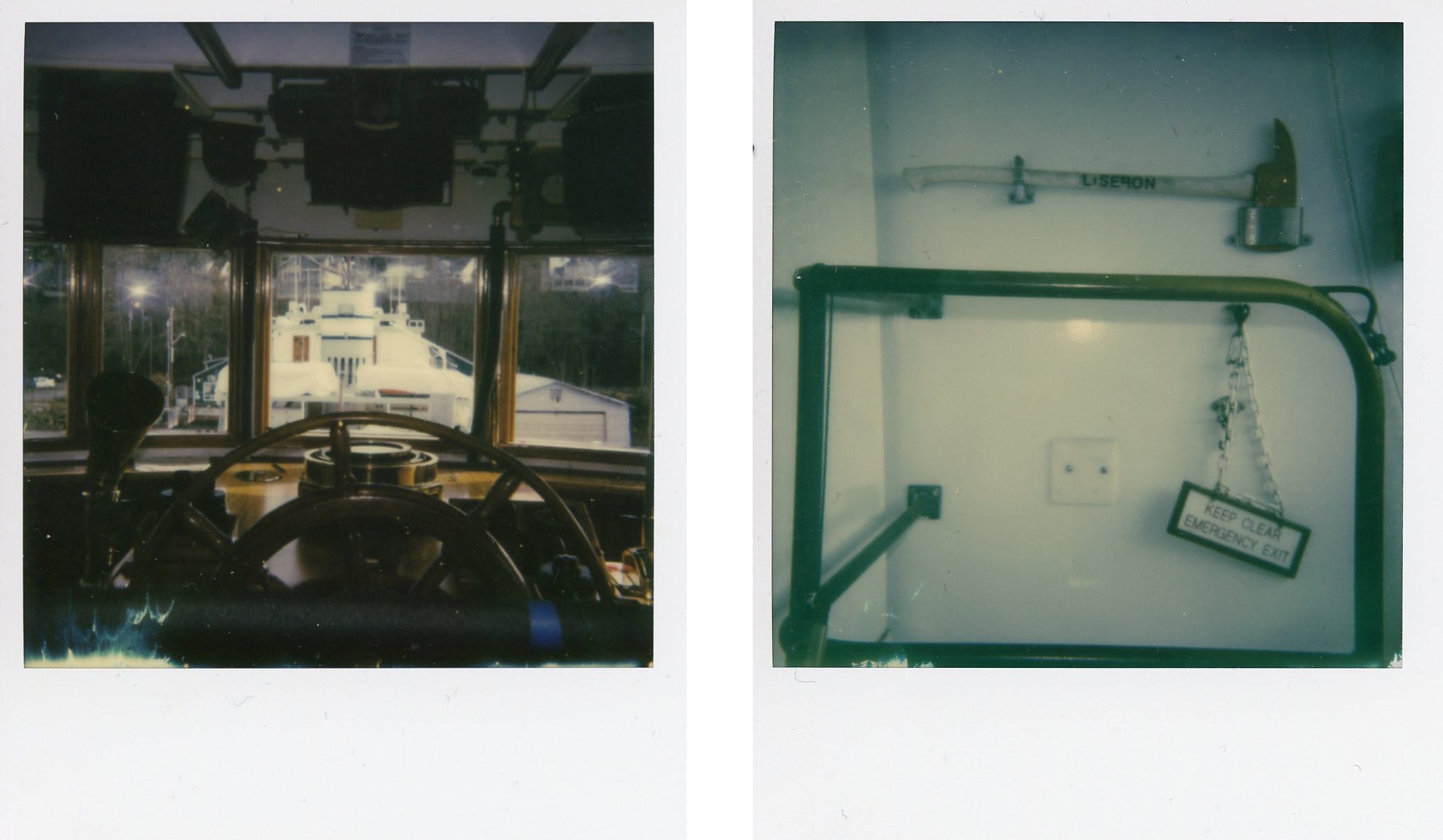

When I ask Liberty what she thinks it is that draws people to boat life, especially those who live-aboard, she talks about the characters you meet in the shipyards and marinas — the loners, the eccentrics, the people who will bring you a bag of DVDs as a welcome to the neighborhood, and the ones you drink beer with at night. But she also talks about an attraction to simplicity and a constitution to overcome struggle they all seem to have, like a shared gene. She talks about the different marinas she’s lived in, from the one in Bellingham where she runs her kayaking company, Kulshan Kayak Academy, and keeps her summer live-on sailboat moored, to the one here in Port Orchard. “It takes a certain kind of person to live on a boat,” she says. “When you find out another person lives on a boat, it really does bond you because they understand that it is difficult. It is a difficult way of life simply because you don’t have the luxuries that people are used to — washer and dryer, toilet, shower — but that’s the way we want to live.
“For me, I don’t need a whole lot, I don’t want a whole lot, I really just enjoy the challenge of trying to find a shower. I love seeing how little I can survive with.”
She says she doesn’t know what exactly it is that makes them like the struggle, but one thing is the complacency she fears comes over people when they don’t have anything challenging them. I tell her one thing I know about wine grapes — that difficult soil produces the most vibrant grapes, and we laugh, but also agree — no one wants to be a bland grape.
Running beneath all this, like a not-so-secret current, is a thing for escapism. It’s understood that a lot of people who live on boats are probably escaping from something or another, whether it’s the basic confines of the traditional, land-bound grind, or a specific situation, or a deep lifelong urge for the kind of freedom that only the open sea can really bring. Escape is something everyone craves, I believe, and that everyone finds in their own personal way. As author Lin Jensen wrote, “Within the structure of every conformity, every confinement and restraint, dwells the heart of the runaway.” The thing about live-aboards that differentiates them is that by living on boats, they wear this heart on their sleeves.
“There’s an element of running away,” Liberty says. “Whatever that may be from, that is specific to each individual, but it is always like running away.”

Once Liberty and I get to talking, it’s clear that this is the heart of the story. The theme of escape is something Liberty knows plenty about. Not only is she literally named Liberty — which is, of course, after a fleet of Navy ships her grandfather crewed on during the second World War — she has also had some very real experiences with escape. It doubles as both the way she got to start living her dream, and how she survived it.
This is also how we get to my favorite part of the story:
This may come as a shock, but in 2010, Liberty was someone who had never lived in or formally worked on a boat, though she’d wanted to since she was a kid. She had a whole life — a photography career, a husband, a house with nice things, like a working washing machine — “things everyone would want,” she says. It wasn’t a bad life at all, just a life that no longer felt hers. Then one day, as she sat watching Whale Wars, something clicked. Watching it filled her with excitement. She said to her then-husband, “That’s it! That’s what I want to do.”
He laughed and thought she was joking. And so did she — kind of. But less than two years later, after a series of chance encounters, and a much longer story than I can tell here, there she was on Whale Wars, on a Zodiac raft three days from land, mooring rings whizzing by her head, feeling more alive than she’d ever felt. She had, in her own way, escaped.
“That’s usually what I go back to because I’ve never felt so fulfilled as I did at that moment,” she says. “That was my dream coming true.”
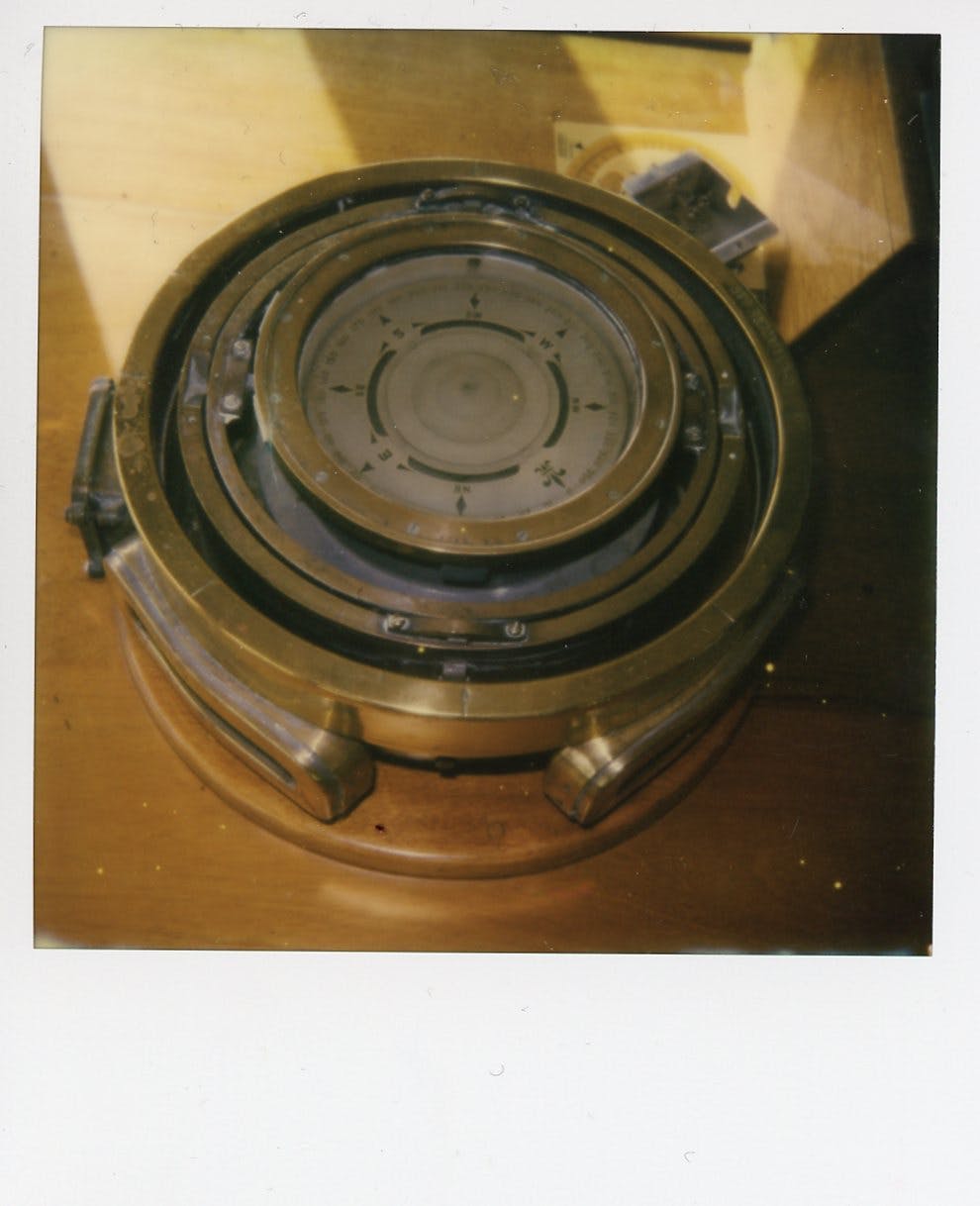
I ask her if this scrape with the bluefin poachers is the most dangerous situation she’s been in, and she says no. Not at all. In an amazingly casual voice she talks about the four death threats she’s had on her head from the Yakuza, the Japanese mafia, and the time they held her at knifepoint during a stakeout — as the figurehead of her team at the time, she was a logical target. How did she get out of this one? “I fought them off with a tripod,” she says, and luckily, a phone call her partner placed just in time to the Japanese police.
In short, boat life is both exactly as romantic as you imagine it, and exactly as difficult. Liberty has some beautiful memories. For instance, at night when the northern lights come out in Alaska, people come out of their houses banging pots and pans. Sometimes she does yoga on the bow of the ship and looks out at the city. Other times, she says, “it’s like, you know what, I just don’t want to be cold when I’m trying to sleep.” When I joke and ask her if it’s like the end of summer camp when she has to say goodbye to people that she’s bonded with, she gets this serious look and says, “it’s interesting that you bring that up — that is the hardest part of my whole life.”
And yes, there is an element of this that’s about being the only girl on the boat, or any situation where you’re the only anything and are prone to feeling less capable just for that reason. When I ask her what it’s like being the only girl, she laughs and says, “like being a slab of meat in a wolf den,” and admits “there are a lot of situations where men don’t think a girl can do boat work,” but she also credits entering this kind of life, and the bosses and coworkers who have believed in her, with making her feel more capable than she ever did before.
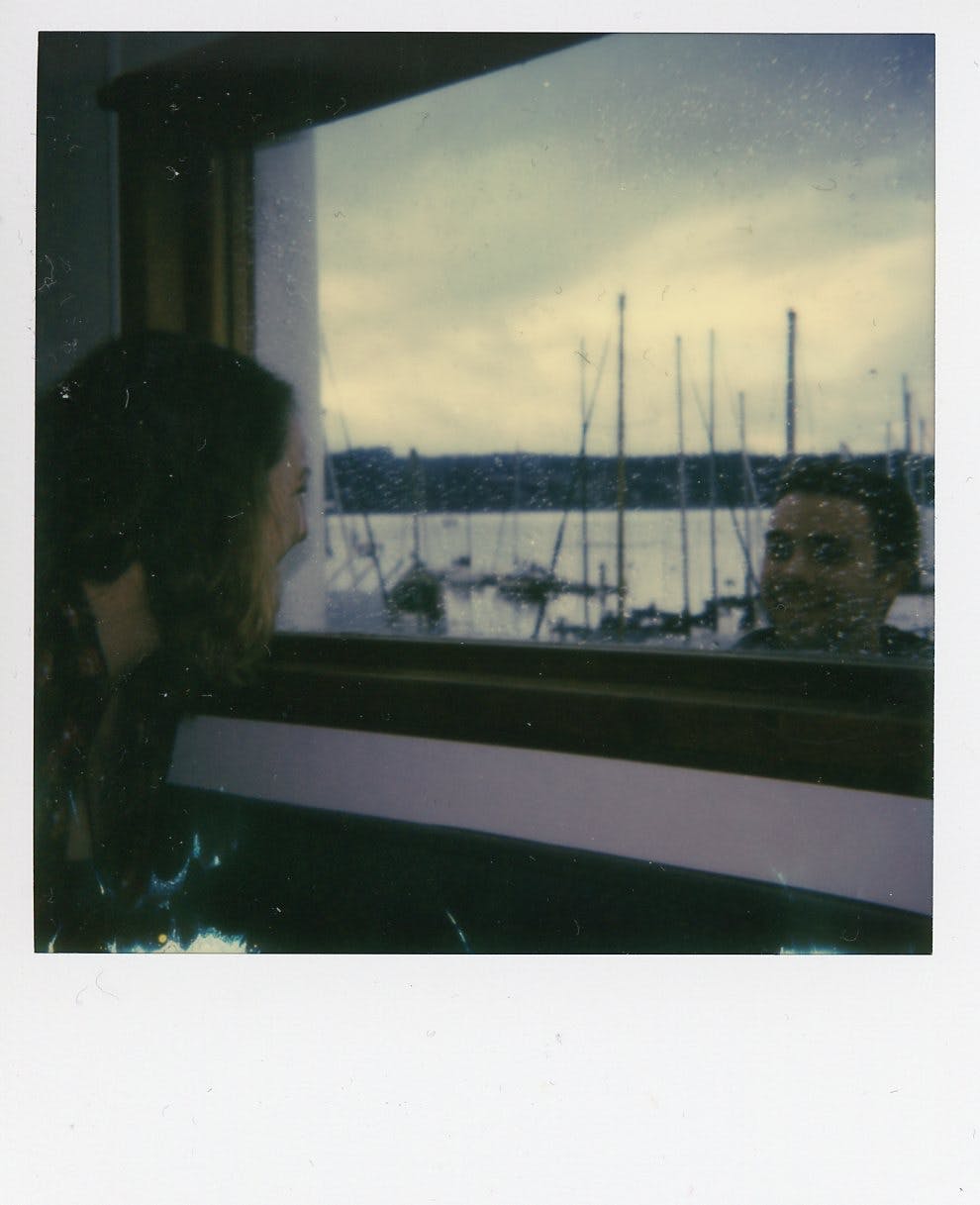
When we walk off the dock so I can get back to the ferry, we run into three other live-aboards from the marina — Mike, Mike, and Robert. We only get a few minutes to talk, but with the time we have, I try to ask them how they ended up here and why they like it. Mike says he moved to the marina after a divorce. Robert lives on a boat his family has owned for years that’s now become home to him, and is also the cheapest option. The other Mike has devoted his life to diving. “It’s the simplicity,” says the first Mike. Most people have too many things. For him, the escape is an escape from the overwhelming amount of material stuff that seems to accompany life on land.
As I pull away on the foot ferry (a tiny two-deck wooden hauler that might be the most charming ferry in Washington) and then eventually walk off into downtown Seattle, I have to say I feel a pang of jealousy for the people who get to stay on the other side. I wonder, do I want to escape? Don’t we all? How do we know whether we have or not? I decide to walk most of the way through town, in honor of freedom and because my ride is stuck in traffic, and when I get near home I find myself at the Pacific Inn, the closest thing Seattle has to a Port Orchard bar. There are no jalapeño poppers on the menu, but they do have onion rings served with tartar sauce. In my dark booth, I’m still trying to figure out what we talk about when we talk about escape. What I come back to is Liberty saying, “I wouldn’t want to live any other way.” It’s not about running away, I think, but about running to something, the thing that makes you say, I wouldn’t want to live any other way.
Learn more about The Boat Company here.
Learn more about Kulshan Kayak Company here.
See photographs of this story by Emily Wittenhagen here.
